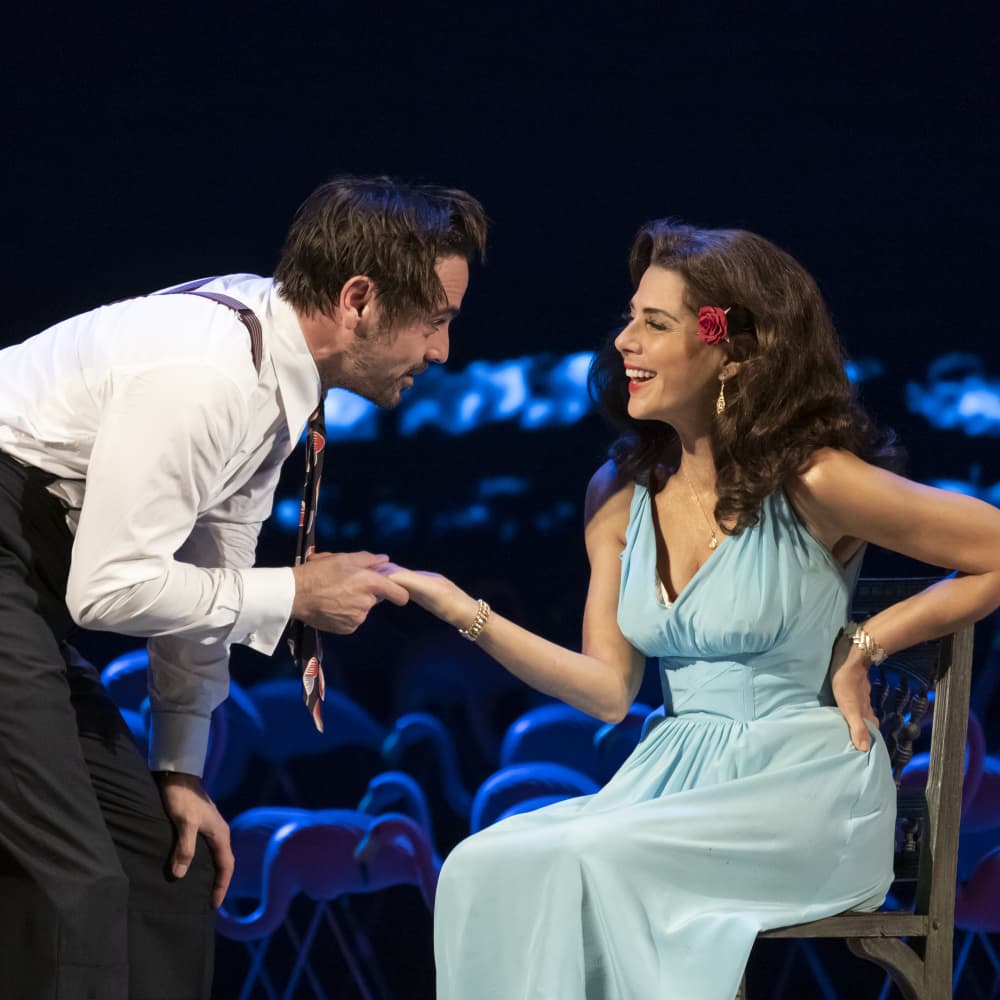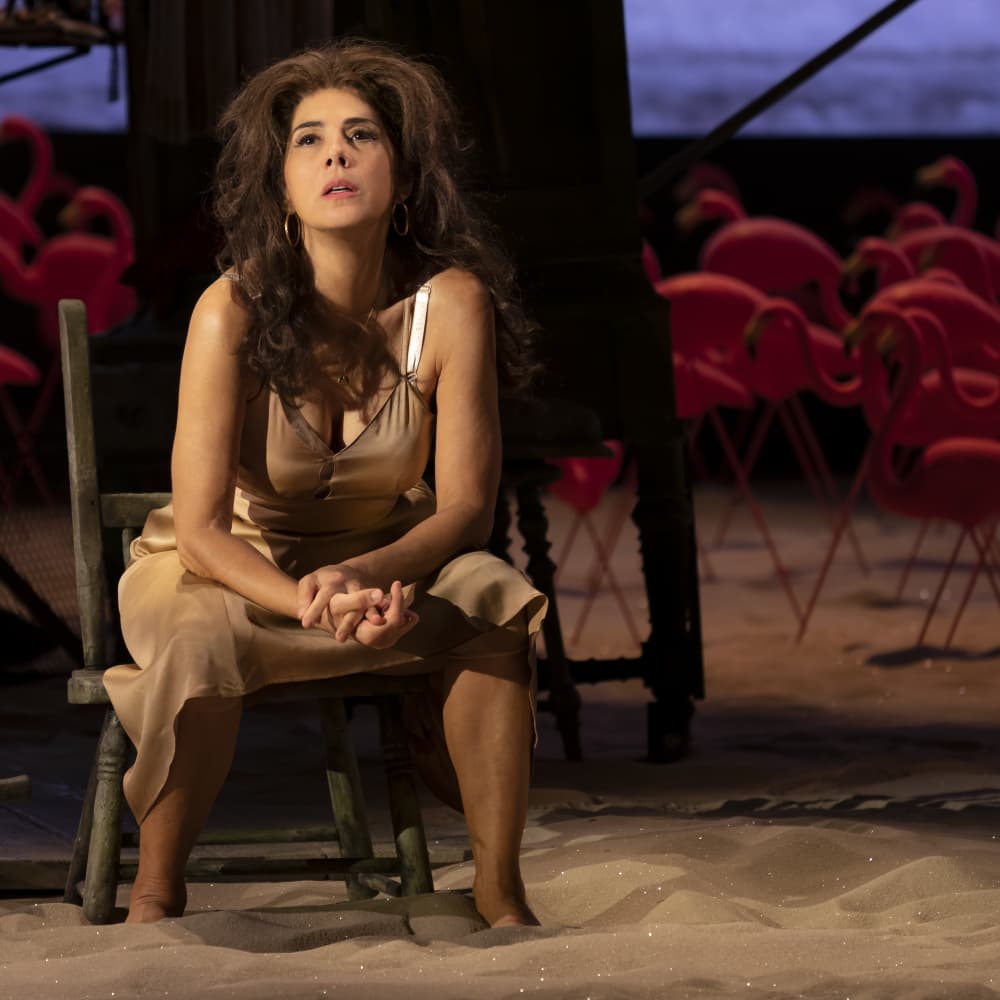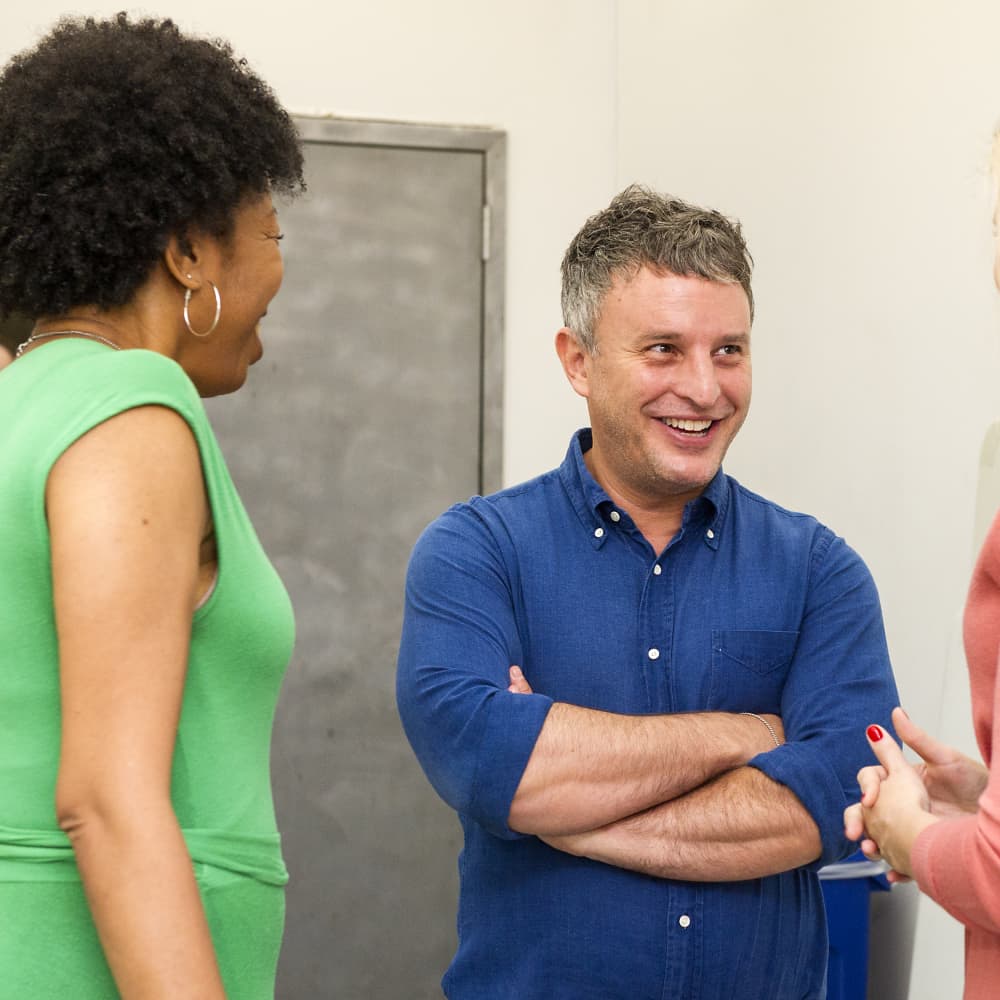Scotland, PA:
An Interview with Michael Mitnick, Adam Gwon, and Billy Morrissette
Posted on: November 6, 2019
On October 19, 2019, Michael Mitnick, book writer of Scotland, PA; Adam Gwon, composer and lyricist of Scotland, PA and Billy Morrissette, director of the film Scotland, PA spoke with teaching artist Jason Jacobs as part of Roundabout Theatre Company’s lecture series (there are spoilers below). An edited transcript follows:
Jason Jacobs: Billy, can you talk to us about how you came upon the idea of adapting the Scottish Play (Macbeth) into an indie film set in the small town of Scotland, Pennsylvania, in the mid-1970s?
Billy Morrissette: When I was 16, I worked at a Dairy Queen in a small town and I hated my boss. And then I went to college and I was cast in a companion piece to Macbeth. I had to watch rehearsals of Macbeth over, over and over. The first thing I thought about Macbeth was, why do they all have the prefix “Mac” in their name -- because there’s Macbeth and there’s Macduff -- I get it already! They’re from SCOTLAND! And then, after being an actor for many years, I was bored one day and I bought a computer and started writing the screenplay. Honestly, adapting the play to take place in a burger joint in Scotland, PA, in the 1970s really worked for me. The hardest part was that Shakespeare kills Lady Macbeth off fairly early on, so I had to find a way to keep that character in the movie for as long as I could because I was married to the actress playing her at the time. And, really, that was the only struggle.
JJ: And why the 1970s? Was that because that was the time you were working at the Dairy Queen?
BM: Yes, that’s when I was 16.
JJ: You shot the film in Nova Scotia -- correct?
BM: Yeah, for months and months.
JJ: And why that location?
BM: Can you guess?
JJ: Because it’s New Scotland?
BM: No, because it’s cheaper to shoot there.
JJ: Makes sense. When did you shoot your film -- in 2000 or in 1999?
BM: 2000 and we were at Sundance in 2001.
JJ: I feel like the late 90s was a great period for indie film. Was there something about making an indie film at that time that felt right to you?
BM: Oh, absolutely. It was a really rich time for indie film. It’s totally different now. Sundance was almost exclusively screening indie film back then. John Cameron Mitchell’s great movie version of his musical, Hedwig and the Angry Inch, was there at the same time we were.
JJ: Let’s talk about how Billy’s film became a musical. Adam, it really started with your being commissioned to write a new musical by Roundabout – correct?
Adam Gwon: Correct. Roundabout had done my musical, Ordinary Days, downstairs as part of Roundabout Underground. Part of that deal is you get a commission from Roundabout to write something new. I had written Ordinary Days on my own and I knew I wanted to find a playwright to collaborate with. Roundabout set me up on blind dates with three different playwrights to chat about musicals. Michael was one of them. Billy’s movie is a film Michael had known and loved and he told me to watch it.
Michael Mitnick: I first saw Scotland, PA in 2001. I watched it on the Sundance channel and I thought that the film would make a really fun musical. I saw it as potentially something that existed between The Little Shop of Horrors and Sweeney Todd. Plus, I felt the music could be rooted in a very specific time period -- so it wouldn’t have the problem a lot of musicals have in terms of cohesion. But I was a 17-year-old kid at the time, so I couldn’t get the rights and I just kept it in the back of my mind until our meeting. When Adam asked me, “Do you have any ideas?” I said there’s a film that I’ve always loved that I think would be a fantastic musical. I got Adam a copy of the DVD – at the time, the film was out of print…
BM:…But now they’re bringing it back, thanks to these two crazy kids.
MM: Adam watched it and ultimately said, “This looks really good. Let’s do it.”
JJ: Adam, when you saw the movie, what was it that made you think it would work as a musical?
AG: I loved that it was based on Shakespeare’s tragedy and had heightened emotions, which I think gives characters a lot to sing about in a musical -- but at the same time, it felt really grounded. Billy’s film took the story and put it in an everyday context, which I also loved. I love the challenge of oddball stories that live in a very particular world that I get to figure out how to make musically cohesive. This was certainly one of those delightful and fun challenges – figuring out how to take this world that Billy created in the movie and adapt it to the stage.
JJ: What was it about ‘70s music that got you excited?
AG: The music of that era is so diverse. There’s a theatricality about the music from that era and the palette is wide enough that I thought I could write a lot of different songs for characters who all have a unique point of view.
JJ: Billy, when these two young men approached you saying they wanted to create a musical version of your film, what was your response?
BM: I thought it made no sense. Michael is one of the 17 people who saw the movie, number one. Yes, I did hear from people every now and then through the years who helped give the film its cult status, but you couldn’t even stream it and it disappeared. So, frankly, I was shocked. It was three years ago -- I believe -- when they started writing. They were convinced they were going to get this up by 2019. And I’m thinking, what -- are you kidding me? Three years!? And guess what? That’s exactly what happened. I sit at the back of the theatre and cry the whole time. It brings such joy to me.
JJ: Can one of you talk about the workshop process?
AG: I think the workshop process was over the course of three years. We took a year and a half to write the first draft. And we did four readings and workshops at the Roundabout and then one out at Northwestern University with their students. They have a program where they bring writers in to workshop new shows. The very first workshop we did, we hadn’t even quite finished the show yet. We had the first act and maybe half of the second act. And our director, Lonny Price, was part of the development from the very beginning and was a huge part of helping us kick the story into gear as a musical and find the right tone. The show changed a lot from workshop to workshop based on what we discovered. It is such a weird world that we’re presenting onstage. And it took a lot of figuring out exactly what we were trying to do, what worked, what didn’t quite work. Some of the workshops leaned more towards zany musical comedy. Others were on the darker side. We just kept trying to find that perfect balance.
BM: Which is all my fault because the film is essentially a wacky tragedy.
JJ: Any example of something that got cut that you care to share?
AG: There was one bit that we all loved that we cut just a week ago in previews. We had an epilogue. The show ended, the characters came out to bow. But before the full company came out, we had a musical epilogue that was the grand opening of McDuff’s Veggie Shack. She came onstage dancing with kale. But we were sincerely wrestling with what note do we want to end the show on. Do we want to end it on a zany note? Or do we want to end it on a slightly more serious here’s-why-we-brought-you-here-this-evening note?
BM: The actors had little green outfits on.
AG: The giant M came down and was lit in green and they all had green McDuff’s Veggie Shack uniforms.
MM: The cast spent a week learning the choreography.
AG: It was choreographed to the hilt.
JJ: That’s a full number written, staged, lit, costumed and cut for the better of the whole show?
AG: Yes.
JJ: Since you started previews, were there any other major changes?
AG: There were two big changes that we made to the songs during previews. One was the opening number that got changed about a week and a half into previews. It used to be a little more oblique about what was coming in the show. It had a slightly scary, sexy vibe but didn’t specifically set up the whole story. We felt with the original opening, that it took too long for the audience to find their way into what the show was going to be.
JJ: When you’re watching from the house during the previews, can you tell when the audience is lost?
AG: The night that I rewrote the opening, Michael and I were sitting in the back watching and it was just a house that was clearly not understanding what we were trying to do. I dragged Michael out at intermission. I said, “We’re leaving, we’re going to the bar. I have to rewrite the whole thing. Come sit with me and let’s drink some alcohol.” So I rewrote the whole thing at a bar during Act II of a not-great performance.
MM: I was sipping wine and looking over at Adam while he’s rewriting. I think he just wanted someone familiar sitting next to him.
AG: The things that you learn about a show when it’s in front of an audience are profound. You think you have an idea about what’s going to land and what isn’t --but as soon as the audience comes in, you just feel it.
MM: And part of my job, along with tracking the story and writing the dialogue, is writing jokes and that's a really easy thing to learn once the audience comes in. So it is very useful to stand in the back with a copy of the script and just clock what doesn't work.
JJ: When did this script actually get frozen?
AG: Tuesday of this week. So what was that? October 15th.
JJ: How do you two collaborate – is it book first and then music? Or is it back and forth?
AG: A little bit of both, depending on the moment. The nice thing about working on an adaptation is you have common ground you're working from initially. Mostly Michael would write the scenes that would set up the songs – a lot of times, he wrote raw material for what a song could be about. And then I'd take that raw material and write a number.
Audience Question #1: How did Lonny Price, your director, become attached to the project?
MM: Lonny is someone who worked with both Adam and me on other projects. Lonny directed a couple of readings of Adam's work and he directed a workshop of something that I worked on. And, so, when it came time to select a director, we thought he’d be the perfect collaborator.
Audience Question #2: Adam, were there songs you created because of what a specific actor brought to the table?
AG: Yes. Ryan, who plays Mac, can deliver a star turn, sing really high notes and nail some high A’s if we ask him to. So, I wrote his final number, the soliloquy, in the most recent workshop knowing that he was the guy who was going to be singing the role. I built it to his vocal range and wrote it so he could shine.
MM: Something that's interesting, or irregular I should say, about this musical is that about half of our cast are the same people who started with us doing the workshops four years ago. And that makes it easier to be able to write toward their strengths.
AG: I would say another actor we wrote specifically for is Megan Lawrence who plays Peg McDuff, because in the movie that part is played by Christopher Walken. We knew from the beginning we wanted to make that character a woman because it is a male-heavy cast and we wanted to balance that out a bit. I think that McDuff was wildly different in every workshop. It was always Megan playing her, but there was a tap dance in her number at one point, because Megan's an amazing tap dancer.
JJ: It seems there's a bit of Columbo in her character now.
AG: Yes, she's evolved into this feisty, 1970s TV detective.
BM: Any of you who remember the '70s and ‘80s may remember on television there were 17 detective shows, with characters and titles whose names all started with Mc: "McMillan & Wife," "McCloud,” “McMurder She Wrote."
Audience Question # 3: Whose idea was it to change the lobby during intermission because that is the most brilliant thing that anyone has ever done.
AG: That was Lonny Price. He said, "I love that they get the restaurant at the end of act one. The end of the act one number has to be the reveal of the new restaurant." That was the first thing he said to us: "The end of act one is about showing the audience a brand-new set." And shortly after that he said, “And we're going to transform the lobby." He made it happen and it is fantastic.
MM: We need to also credit the set designer, the brilliant Anna Louizos.
Audience Question #4: I'm so curious, when you do a musical off-Broadway, is your goal always to get it to Broadway?
AG: I think for me, honestly, we wrote the show for this theatre. I think we all hope that it has a life in some way after this, whether on a cast album or at high schools across the country or on Broadway. Who knows what will happen? To be part of the support system the Roundabout offers has been amazing -- we had the freedom to make the show that we wanted to make, which might not necessarily be the case if we were writing it for some place on a bigger scale.
MM: The best part of a Broadway production is that it gives the show a higher profile. So there's a greater chance that more people will want to do it, because it has a certain cache. But mostly, I feel the exact same way that Adam does.
BM: Take away a few of the “f-words,” and it could be the greatest high school show ever. I see it being performed in every high school. It's really very funny.
Audience Question #5: I lived during the '70s and the costumes were really spot on. I love that Pat is wearing this '70s status dress when they finally make it big. Did that come about because Mac had on the iconic John Travolta leisure suit?
AG: I will definitely let our costume designer, Tracy Christensen, know you appreciated her work. Tracy had these giant poster boards for every character with images from the '70s of what different characters would wear in each scene. Their status changes so much that they run the whole gamut of fantastic '70s fashion in two hours.
JJ: Actually, that gets back to the theme of success and ambition at any cost in the musical. That's in both the original play and film too.
MM: For me, this idea of people and communities who are disenfranchised and feel like they're not being heard by the people in power and what they're going to do about it was relevant and interesting.
BM: I love the musical so much because they made it political – like Mac's last song -- it becomes about class distinctions. I think it really, really works well given the haves and have-nots in this day and age.
Audience Question #6: Given that you have set the musical in 1975, did you ever consider setting it, say, in 1965? Because in '75, McDonald's was already here and had instituted many of the innovations that are part of the plot.
BM: I googled this yet again recently and as far as the drive-through innovation is concerned, shockingly it was Wendy's about eight years earlier that had the first one. McDonald's first drive-through wasn't until '74 or '75, believe it or not. And certainly, in my small town, that's when it showed up – like it does in this small town.
MM: That's something we had lots of conversations about and there were some workshops where we actually played with an alternative universe kind of thing.
AG: We only had one question from Billy when we acquired the rights to his movie, which was, “Are you keeping it in the '70s?” And we said, “Sure!” I mean, obviously the characters that you're seeing in the show didn't invent or create McDonald's. There are so many things that an audience has to get on board with that we thought, okay, let's keep them in because they work really well in the movie. We tried to find the correct on-ramp so the audience hopefully thinks, oh, I get it, it's a different version of reality…
MM:I think the time period works as is. Because you're watching two smart young people who want a better life. We can all Identify with that. They try to get ahead in legitimate ways and are stonewalled by bullshit and their boss, Duncan. And then once they start to become ambitious and you see Duncan's death -- which, depending on how you look at it, is a murder or an accident – the challenge was keeping Mac and Pat as close to heroes as possible while they're doing despicable things. It’s the Scottish Play, but to function as a musical, we need the audience on their side and seeing the impossible odds that they're up against to get what we feel they deserve until we get to Banko's death in act two, where you start to look at them quite a bit differently.











